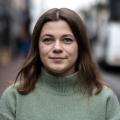
A three-year-old is undergoing gruelling treatment for a rare and aggressive brain tumour.
Anastasia Ogden, from Hailsham, was diagnosed with a fast-growing form of brain cancer called atypical teratoid rhabdoid tumour earlier this year.
The onset was sudden, as her mum Paulina Niemiec recounts: “She was just a happy, healthy little girl until August 26.
“She’d spent the day running and playing in the park and it wasn’t until we were walking back that she started feeling dizzy and losing her balance. It was a hot day so I wasn’t too alarmed and thought maybe she just hadn’t had enough to drink or had picked up a bug.
“That night she was absolutely fine and the next morning we went to visit my cousin in Seaford. It was whilst we were there that she took another turn, feeling dizzy, tilting her head to the right and getting so wobbly that she looked drunk. I knew something wasn’t right and so took her straight to the Brighton Children’s Hospital.”
The next day, Paulina and her family were told that Anastasia had a brain tumour.
“Our whole world turned upside down,” Paulina said.
A hospital optometrist discovered Anastasia’s optical nerve was swollen. A scan revealed that the three-year-old had a brain tumour and was suffering from a build up of fluid in the brain known as hydrocephalus.
She underwent surgery to drain excess fluid on her brain and was recovering well, until three days later.

Paulina tells the story of her illness worsesning. She said: “My mum and dad were at the hospital and Anastasia said that she was feeling tired, so I told her to have a nap and went to take a shower.
“Suddenly, I heard her scream and ran back into her room to find her vomiting, having seizures and being unresponsive. Then her oxygen level dropped and the emergency button was pressed as I was ushered out of the room.
“She was taken for an emergency CT scan, which showed her tumour was bleeding and had expanded so much that it was suffocating her brain.”
Anastasia was talken into theatre for a surgery to cut her tumour out.
“We were told to prepare ourselves for the fact that she might not make it out alive. It was the longest 18 hours of my life,” said Paulina.
Surgeons managed to remove more than 90% of Anastasia’s tumour. It took her weeks to recover.
Anastasia’s family were told that if they had taken the whole tumour out she would not have woken up again.
“She woke up after a few days but just stared off into space,” said Paulina.
“There was no communication and no movement. She just lay there with her eyes open."
The family did not want Anastasia’s brother Oscar to see his sister unwell, but after a while they said they felt that she needed him.
Paulina said: “They had a cuddle and I can’t help feeling that his energy helped her because it was just a day or two later that she started to talk.”
The plan is now to shrink the rest of Anastasia’s tumour using chemotherapy and radiotherapy. Her cancer cells have already spread to other parts of her brain and spine.

In September, the three-year-old began her first of nine rounds of chemotherapy. Last month, she started four weeks of radiotherapy. She has to be sedated for each session.
Paulina is now working with the charity Brain Tumour Research to tell Anastasia’s story.
Charlie Allsebrook, community development manager for Brain Tumour Research, said: "Anastasia’s story is a stark reminder of the fact brain tumours kill more children than leukaemia and any other cancer, yet just 1% of the national spend on cancer research has been allocated to this devastating disease.
"We wish Anastasia the best of luck with her ongoing treatment and are grateful to Paulina for working with us to raise awareness of ATRT and other brain tumours. Together we will find a cure.”



Comments: Our rules
We want our comments to be a lively and valuable part of our community - a place where readers can debate and engage with the most important local issues. The ability to comment on our stories is a privilege, not a right, however, and that privilege may be withdrawn if it is abused or misused.
Please report any comments that break our rules.
Read the rules hereLast Updated:
Report this comment Cancel